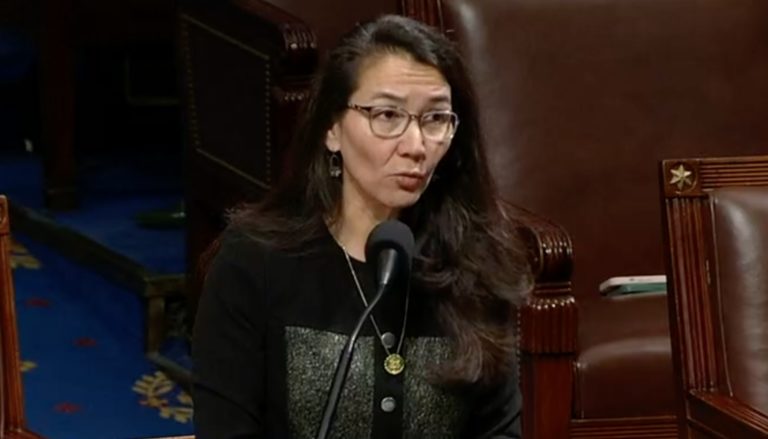By SUZANNE DOWNING
Washington, D.C. could use another fiscal hawk like the late Sen. William Proxmire of Wisconsin.
During his Senate career from 1957 to 1988, Proxmire instituted a regular Golden Fleece Award, with which he mocked “the biggest, most ridiculous or most ironic example of government spending.”
Among his infamous recipients was the Department of Justice, receiving the award for conducting a study on why prisoners desire to escape.
Another honoree was the U.S. Postal Service, spending $4 million on an ad campaign urging Americans to write more letters.
In today’s government borrow-and-spend climate, Proxmire would find an embarrassment of riches for his satirical accolades. Here’s one that would surely join the ranks:
In the hardy Southeast fishing, timber, and tourism town of Wrangell, the school district had the idea to apply for a federal grant for a new electric school bus. With the Environmental Protection Agency distributing nearly $1 billion in these electric school bus grants last year, it was raining money, so why not one for a hamlet in the rain forest?
In October, the Biden Administration awarded $395,000 to Wrangell for the purchase of the electric bus, intended to expedite the transition to zero-emission vehicles and foster “cleaner air in schools and neighboring communities.”
Don’t get me wrong — I love Wrangell. It’s a great town and I love the people. But most students in this Alaska town can walk to school or catch a ride with an older sibling or parent who works at the school.
Wrangell, with its 2,100 souls and only about 25 miles of road, has a school system serving 263 students — at most — and two school buses. The number of students is falling so fast that the district is seriously considering combining two of the three schools into one. And there are no neighboring communities in Wrangell, unless you get on a ferry or a plane.
As for the clean air aspect, Wrangell boasts some of the cleanest air in America. It’s situated in the middle of the nation’s largest national forest, the Tongass, which is the size of Virginia yet has a population of only 70,000 across its numerous islands and archipelagos. Between the millions of carbon-capturing trees and millions of acres of carbon-absorbing ocean, Wrangell is in a rainforest that is already on hydro power. It’s not belching much of anything into the air, which is swept clean by ocean breezes.
But somehow Wrangell, in spite of its voters’ overwhelming preference for President Donald Trump in 2016 and 2020, won a grant from the Biden Administration.
Its success was due to the fact that more northern communities in Alaska can’t use electric buses, as their batteries just don’t last in the cold winters, and the last thing communities need is to have a bus full of children break down in sub-zero blizzards. For most of Alaska, electric vehicles don’t make sense.
Sen. Lisa Murkowski was euphoric. After all, Wrangell is where her father, former Sen. Frank Murkowski, and his wife, Nancy, live. Lisa brought home the bacon.
“Congratulations to the Wrangell School District for being a recipient of the EPA’s Clean School Bus Program, established by the Infrastructure Investment and Jobs Act. Wrangell’s new electric school bus will enhance the district’s ability to operate efficient and safe bus routes. I am thrilled to witness Alaskan communities reaping the benefits of my bipartisan infrastructure law,” she said in a statement.
The projected cost of the new electric bus itself is $375,000, with an additional $20,000 designated for a charging station.
Thus, the nearly $400,000 to transport even half of those 263 students pencils out to $1,500 per student. That $400,000 amounts to 8% of the district’s annual school district’s $5 million operating budget for a bus that may run 10 hours a week.
This alone would qualify it for Proximire’s Golden Fleece Award, although “Golden Fleet” might also be appropriate.
But then, an unexpected hurdle arose: The EPA grant stipulates that the bus company must dispose of one of its diesel-fueled buses. Not a mere sale or decommissioning of the bus, but complete destruction was required.
Taylor Transportation, the company that has the bus contract in Wrangell, questioned the wisdom of destroying a perfectly functional school bus from its fleet.
With the clock ticking, the district approached the EPA with a proposal: Could Wrangell purchase a bus in another jurisdiction, destroy it, present evidence of its destruction to the federal agency, and subsequently qualify for the grant for the new electric bus?
The EPA saw no apparent obstacles to this unconventional workaround.
For the past few weeks, Wrangell scoured other states for a bus that fit EPA’s criteria, which includes that the bus must have served as a functional student transporter for the last two years.
In other words, the bus Wrangell buys and destroys cannot be the dilapidated remnants of a Burning Man excursion.
In addition, not just any method of destruction will suffice. The EPA has regulations governing the disabling of a diesel school bus—no cliffs can be involved, for instance.
Sen. Proxmire would revel in the circus that is this wasteful endeavor.
Within the Infrastructure Bill, bizarre trinkets like this abound for every community across America, enough to keep Golden Fleece Awards going for years.
Regardless of party, we need more fiscal hawks like Proxmires and fewer spendthrift Murkowskis in the Senate.
We need senators who will put their foot down on wasteful spending, not put their foot on the pedal for borrowing against the futures of our children.
Suzanne Downing is publisher of Must Read Alaska. Credit for original reporting on this grant to KTSK.











